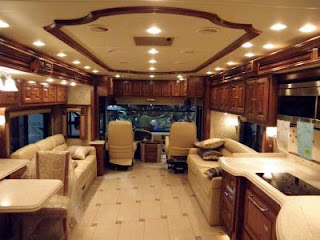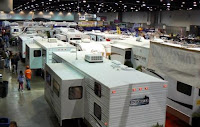The second biggest reason people decide not to buy an RV is that they don’t know who they can trust. It’s not uncommon to hear your RV salesperson say something like, “This manufacturer builds the best models". After you have visited a number of dealers it’s like a broken record. Everybody thinks their brands are the best in the industry. Here's a typical line, "Four Winds has the BEST motorhomes. There's a reason all of the rental RVs you see on the road are made by Four Winds.... Dependability!!" By the way, we fell for this line and bought a Four Winds. It turned out the reason they were on the road as rentals is because they are cheap, assembly line products. Follow the dollar, and you'll almost always find the real answer.
Take your time...and Follow these Instructions:

3. Gather as much information as possible about the RVs under consideration. Look at the special features, condition and any other important aspects of the RV that matter the most to you. When comparing models, be sure to factor in any and all extra features.
4. Check out the prices online and at lots for the model you are interested in. You can look on ebay for completed sales or check Craigs List in different localities. Prices in other states may surprise you. We found the new model we wanted for $60,000 in Iowa that was selling for $90,000 in most every other state. We called dealers across the country and found prices varied. We thought Florida must have the best deal, but their prices were among the highest. You may find an extraordinary price elsewhere, but you will forfeit the personal customer service from your seller. We have had quite a few little problems with our 31K from Motor Sportland, but the salesman we bought through has taken care of every one of them...and even thrown in a free RV wash here and there.
5. Look at the tax burden or benefits that different models may bring you. Think of motor fuel tax, sales tax and individual income tax. If you register your RV in a state other than your own for tax benefits, be careful. We just moved to Florida but were given this advice by a tax attorney: "If you still maintain a church membership in SLC, have burial plots in SLC, and all your children live in SLC, you should expect the SLC tax folks to argue that the external factors are inconsistent with your claimed move to Florida."
Planning Tip: Be consistent. If you claim you've left a state, don't go back to get a resident fishing or hunting license in your former home state. We know of some hefty fines for doing this very thing! Ditto on library cards (hold one in the state in which you reside, not the state you moved out of), and so on.
One of the first steps in your state tax planning is to figure out the starting line. Which state currently thinks you live primarily there? Learn the rules as to how you can end that tax relationship and keep detailed records supporting your tax home state.
Tax Reduction Planning Tip: Make sure you land in your new tax home. Perhaps your first stop should be in your new tax home state, where you spend enough time and set up enough connections to make it your new home state for income tax purposes. Buy burial plots (really!) Join a church or lodge or other organization. Go to the dentist. Get a local library card. Open a bank account and move your accounts. Hire a CPA to handle your tax returns.
Planning Tip: Did we say to keep a log book? Maintain a detailed and accurate calendar showing where you were, which days you worked and in which states. Staple RV park receipts and receipts for gas and shopping to the calendar as they will prove where you were. We have a folder of receipts from the first day we crossed into Florida.
Your suggestions are welcome here. I'm sure you're more experienced than I am and can help us all with the advice we need in this area. Thanks for your help!
Take your time...and Follow these Instructions:

1. Decide what type of RV you want. You can choose gas or diesel. Diesel gives you better mileage, but a noisier unit and higher purchase price. You can get the luxury of a Class A (with the great driving views) or the maneuverability of a Class C (but with less overall space). Travel trailers can be intense to pull and wear the driver out. We recently almost got hit with shrapnel from a trailer being pulled past us in a campground when the left wheels hit a big rock on a curve and tore off one of the tires and some of casing. You can avoid the sway of trailers with a fifth wheel, where the weight of the trailer is over the truck's rear axle. Just make sure you have enough power to pull it. (As a note of interest, Bob's great-grandpa Bryant Olds invented the 5th wheel.) Or you can go for the fun of a towable toy hauler. The biggest question is: "What do you want to do with your RV?" If it's going to sit in a trailer park, a trailer could be ideal...especially since it's designed all on one level and easy to get in and out of.
 |
| This might be all you need, so why buy more? |
 |
| We met a great couple laughing about how they bought this trailer and "hid" it from the condo association in their garage. |
 |
| Taj-ma-Winnebago |
2. Look at how different manufacturers compare to one another. This may seem time consuming, but an RV is a big enough investment to merit doing your homework. (Your mother would approve.) Some top makers are Fleetwood, Winnebago, Monaco, National, Country Coach, Skyline, Forest River, R-Vision and Thor. Don't rely on "looks" or floor plan to make your decision. Get in a model and test how everything works. We even set up the couch and table beds before buying. Some buyers don't know you can (and should) test drive the unit. Try driving into a shopping center to see how you like parking it and definitely get it on the freeway to hear how sound it is.
4. Check out the prices online and at lots for the model you are interested in. You can look on ebay for completed sales or check Craigs List in different localities. Prices in other states may surprise you. We found the new model we wanted for $60,000 in Iowa that was selling for $90,000 in most every other state. We called dealers across the country and found prices varied. We thought Florida must have the best deal, but their prices were among the highest. You may find an extraordinary price elsewhere, but you will forfeit the personal customer service from your seller. We have had quite a few little problems with our 31K from Motor Sportland, but the salesman we bought through has taken care of every one of them...and even thrown in a free RV wash here and there.
5. Look at the tax burden or benefits that different models may bring you. Think of motor fuel tax, sales tax and individual income tax. If you register your RV in a state other than your own for tax benefits, be careful. We just moved to Florida but were given this advice by a tax attorney: "If you still maintain a church membership in SLC, have burial plots in SLC, and all your children live in SLC, you should expect the SLC tax folks to argue that the external factors are inconsistent with your claimed move to Florida."
Planning Tip: Be consistent. If you claim you've left a state, don't go back to get a resident fishing or hunting license in your former home state. We know of some hefty fines for doing this very thing! Ditto on library cards (hold one in the state in which you reside, not the state you moved out of), and so on.
One of the first steps in your state tax planning is to figure out the starting line. Which state currently thinks you live primarily there? Learn the rules as to how you can end that tax relationship and keep detailed records supporting your tax home state.
Tax Reduction Planning Tip: Make sure you land in your new tax home. Perhaps your first stop should be in your new tax home state, where you spend enough time and set up enough connections to make it your new home state for income tax purposes. Buy burial plots (really!) Join a church or lodge or other organization. Go to the dentist. Get a local library card. Open a bank account and move your accounts. Hire a CPA to handle your tax returns.
Planning Tip: Did we say to keep a log book? Maintain a detailed and accurate calendar showing where you were, which days you worked and in which states. Staple RV park receipts and receipts for gas and shopping to the calendar as they will prove where you were. We have a folder of receipts from the first day we crossed into Florida.
Your suggestions are welcome here. I'm sure you're more experienced than I am and can help us all with the advice we need in this area. Thanks for your help!









No comments:
Post a Comment
Please post....or send comments/questions directly to us at camphost.White@gmail.com